2024 Baseball HOF preview: Abreu aims to rise, others keep holding on
With the Baseball Hall of Fame's class of 2024 announcement approaching, it's time to review this year's ballot. Today, we look at five returning candidates still clinging to their spots at the bottom of the ballot. While they aren't going in this year, their intriguing cases are at least worthy of further examination.
Note: All WAR figures from Baseball Reference unless otherwise noted.
Bobby Abreu
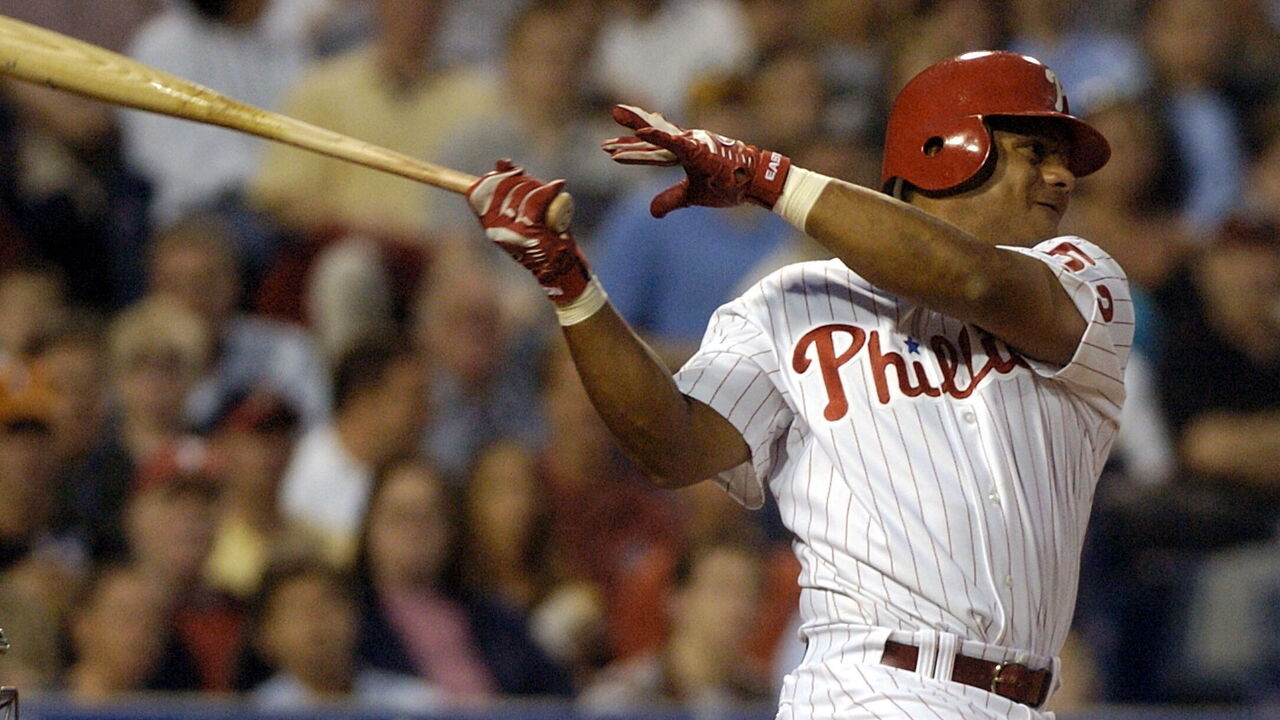
Position: RF
Teams: Astros, Phillies, Yankees, Angels, Dodgers, Mets
JAWS: 50.9 (21st at RF)
WAR: 60.2 (20th)
Year on ballot: 5th (15.4% in 2023)
| GP | BA | OPS | H | HR | RBI | SB |
|---|---|---|---|---|---|---|
| 2425 | .291 | .870 | 2470 | 288 | 1363 | 400 |
Abreu doesn't have many of the counting numbers normally associated with the Hall of Fame. He wasn't the flashiest player, and he spent most of his prime with some mediocre Phillies teams. But he was a quietly consistent and durable five-tool talent with an incredible knack for getting on base. Abreu's resume includes a pair of 30-30 seasons (one of them 30-40), eight straight seasons with 100-plus walks, and 574 doubles that sit tied for 25th all time. He also ranked in the top 10 in on-base percentage eight times.
On the metrics side, Abreu's seven-year peak WAR (41.6) is higher than that of Hall of Famers Tony Gwynn and Vladimir Guerrero. His career WAR is better than several of his notable peers, including Guerrero and future inductee Ichiro Suzuki. By JAWS, he compares favorably to Guerrero and Dave Winfield, among others, though he's still well below the average Hall of Fame right fielder and even trails some fellow outsiders.
Escaping the 5% danger zone and getting into double digits was one piece of great news for Abreu last year. Another was that he saw a 79.1% jump in overall support, which he needed just to have a chance of making a Larry Walker-esque climb. Not only did he get it, but he actually bettered Walker's fourth-year total of 10.2%, his low point before that historic jump to induction. Abreu's got six years left, and while that's still a long time, the clock is also ticking faster. For all of his progress, Abreu only gained 16 net votes last year, and he must at least maintain that to set himself up for the stretch run. Right now, that's not happening, as he's polling at 18.1% on the tracker - almost exactly where he was last year before the announcement - while only gaining two public votes for a net gain of minus-3. This year's goal has to be reaching 20%, but if he has to rely on traditional and private voters to get there, it's going to be very difficult for him.
Mark Buehrle
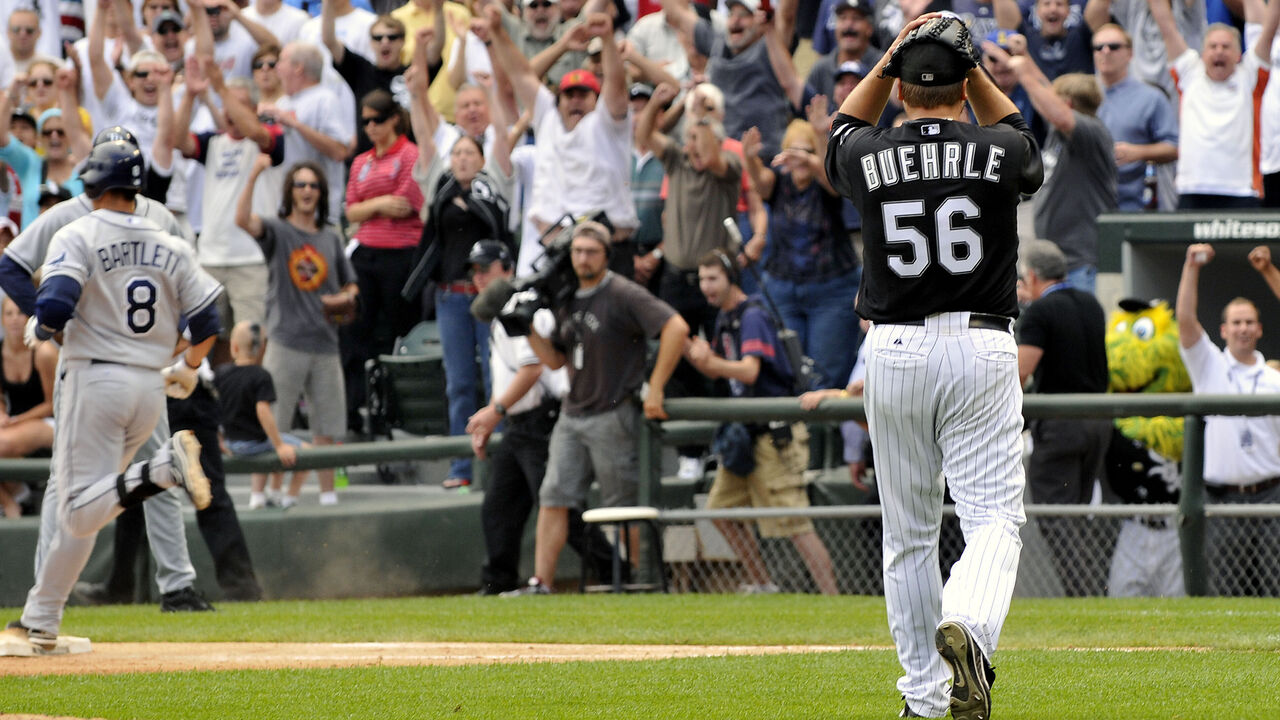
Position: SP
Teams: White Sox, Marlins, Blue Jays
JAWS: 47.4 (90th at SP)
S-JAWS: 47.4 (78th)
WAR: 59.1 (69th)
Year on ballot: 4th (10.8% in 2023)
| IP | W-L | ERA | WHIP | K |
|---|---|---|---|---|
| 3283.1 | 214-160 | 3.81 | 1.28 | 1870 |
He worked quickly, threw slop, and ate up innings like nobody else in his time. Buehrle was the antithesis of 21st-century starting pitching and continues to present a fascinating conundrum as he once again clings to his spot.
A 38th-round pick of the White Sox in 1998, Buehrle defied the odds to throw more innings than all but three pitchers (CC Sabathia, Zack Greinke, and Justin Verlander) since 2000, and he crossed the 200-inning mark in 14 consecutive campaigns. His resume includes five All-Star appearances, four Gold Gloves, and a pair of no-hitters, one of which was perfect. Buehrle's 12 years with the White Sox and heroic performances during their 2005 World Series run made him a hero on the South Side of Chicago, where his No. 56 is retired.
Buehrle's overall numbers, both traditional and advanced, don't scream Hall of Fame, though he gets extra points for being a dinosaur when his kind was (and still is) going extinct. That's still probably not enough - but should it be? As starting pitching continues to evolve and workloads keep decreasing, Buehrle's unique (for his era, at least) career could start to age like fine wine and look a bit more worthy against contemporary starters who will hit the ballot with far fewer innings in the coming decades.
Buehrle's ballot journey has somewhat mirrored his career in that he's survived far longer than most expected. However, this is proving to be his toughest test yet, as he's polling at 6.5% in the tracker and has already lost six votes from last year. This may finally be the year where he can't stave off 5% any longer. Even so, just lasting four years here is another reminder of how unique and special his career was. Hall of Famer or not, you'll remember watching Mark Buehrle pitch, and that's worth something.
Torii Hunter
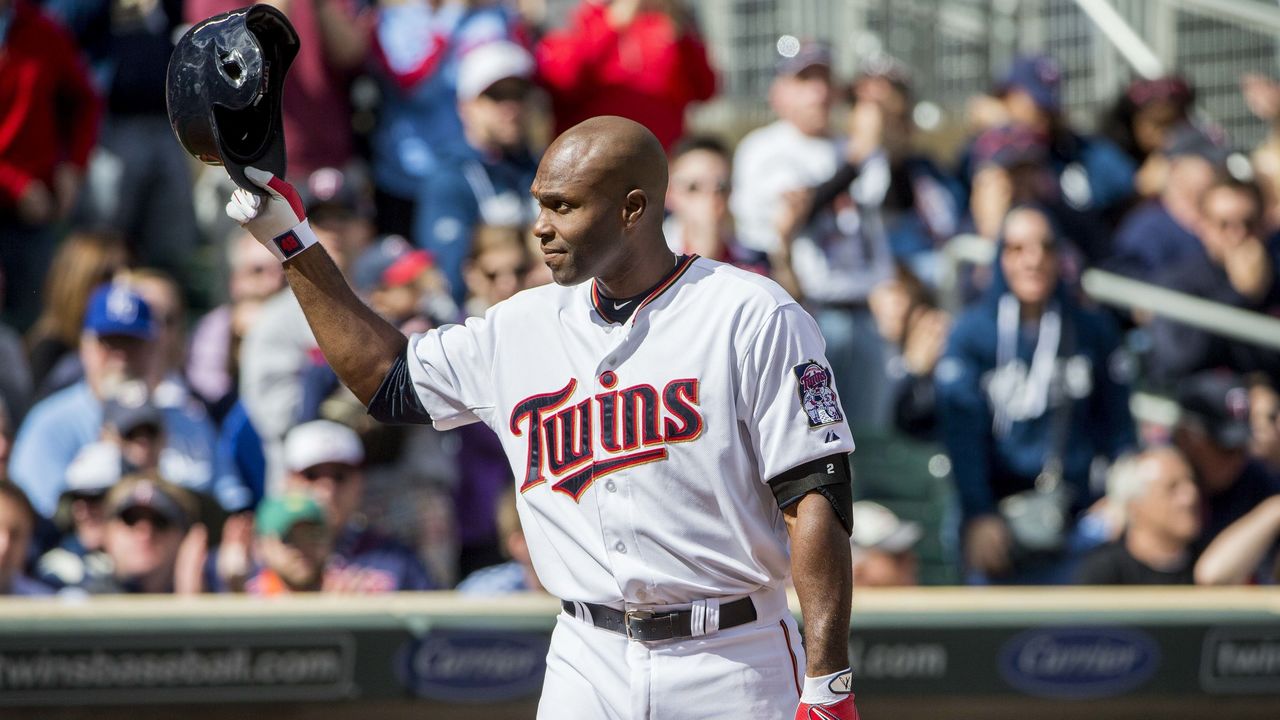
Position: CF/RF
Teams: Twins, Angels, Tigers
JAWS: 40.7 (35th at CF)
WAR: 50.7 (26th)
Year on ballot: 4th (6.9% in 2023)
| GP | BA | OPS | H | HR | RBI | SB |
|---|---|---|---|---|---|---|
| 2372 | .277 | .793 | 2452 | 353 | 1391 | 195 |
Defense was Hunter's calling card, and there should always be room for defense in the Hall of Fame. But he's not even close to the best defensive center fielder on this ballot.
Hunter won nine Gold Gloves with the Twins and Angels; only six outfielders have won more. The five-time All-Star contributed to playoff clubs in Minnesota, Anaheim, and Detroit, and - despite his glove-first reputation - won a pair of Silver Sluggers later in his career. He also surpassed the 2,000-hit mark, which will surely appeal to some voters. But for all of the brilliant catches he made - most memorably in the 2002 All-Star Game - his reputation might be bigger than his performance. He's tied for 82nd among center fielders in fielding runs, a stat that encompasses all eras, with the likes of Aaron Rowand, Ruben Rivera, and George Gore - whose last game came 83 years before Hunter was born.
Hunter barely scraped by 5% in the last two elections thanks to a few extra private votes in the final tally, but his overall support has still cratered after a surprising 9.3% in his debut year. That he regained five net votes last year to hang on yet again was quite surprising, although all it did was ensure he'll keep languishing at 5-6% if he does somehow survive again. Lloyd Christmas might tell him there's a chance, but the reality for Hunter is that it's over.
Francisco Rodríguez
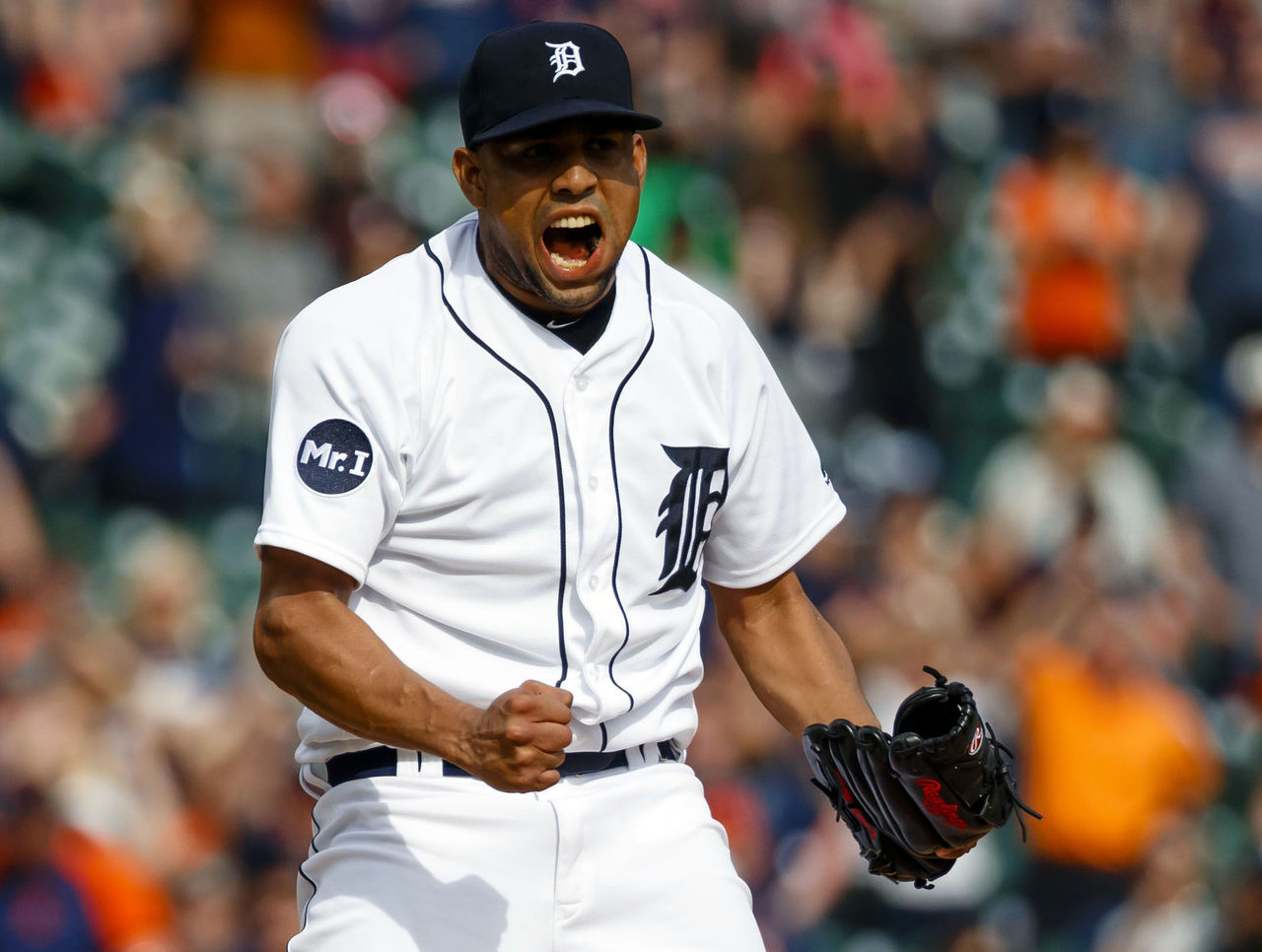
Position: RP
Teams: Angels, Mets, Brewers, Orioles, Tigers
JAWS: 20.9 (35th at RP)
R-JAWS: 21.1 (12th)
WAR: 24.2 (25th)
Year on ballot: 2nd (10.8%)
| IP | W-L | ERA | WHIP | K | SV |
|---|---|---|---|---|---|
| 976.0 | 52-53 | 2.86 | 1.15 | 1142 | 437 |
Relievers are always more difficult to judge and are often ignored, so it's good that Rodríguez hung on for a second year. His resume absolutely warrants closer examination.
"K-Rod" burst onto the scene as a 20-year-old playoff hero for the 2002 Angels. After striking out 13 batters in just 5 2/3 regular-season innings as a September call-up, Rodríguez electrified during the Halos' World Series run, authoring a 13-inning scoreless streak while striking out 28 as their eighth-inning weapon. He continued to dominate after ascending to the closer's role, leading his league in saves three times and setting the single-season record (62) in 2008. A six-time All-Star, he finished fourth or higher in Cy Young voting three times, tallied six 40-plus save seasons, and owns the most saves among pitchers not in the Hall.
Rodríguez's impressive position on the saves leaderboard stands out, but saves alone don't make a Hall of Fame reliever, especially one who retired before turning 36. An inconsistent back half of his career also puts a dent in his overall case. Rodríguez's 16 seasons are clearly divided into "Angels" and "post-Angels" sections, with his dominance waning after leaving Anaheim in 2009.
| TEAM | ERA+ | FIP | K% | OPP. AVG | WAR |
|---|---|---|---|---|---|
| Angels | 189 | 2.84 | 31.9% | .189 | 16.0 |
| Post-Angels | 122 | 3.71 | 25.5% | .222 | 8.2 |
Hindered by that post-Angels run, Rodríguez lags behind the pack in most advanced stats. R-JAWS, Jay Jaffe's adjusted metric designed to offset starting pitching numbers and better evaluate relievers, places him 12th at the position - ahead of three Hall of Famers but still over eight points behind the average HOF reliever. He's also well back of his fellow contemporary one-inning closers and the HOF mean in R-JAWS, WAR, and seven-year peak WAR. That he has to continue to compete for votes with the rapidly rising Billy Wagner - who bests K-Rod in every category except saves and playoff performance - also hurts.
Rodríguez's survival last year wasn't a guarantee, so clearing the danger zone with ease (10.8%) was a good start. However, he's lost three returning votes (a net loss of minus-2) on the tracker, so it's clear he needs more help to stay afloat, let alone keep growing his case. Where he'll find that help before Wagner's either elected (which will help Rodríguez) or ages off remains the question. It will be unfair if K-Rod falls below 5%, but that's also the unfortunate reality most relievers end up facing.
Jimmy Rollins
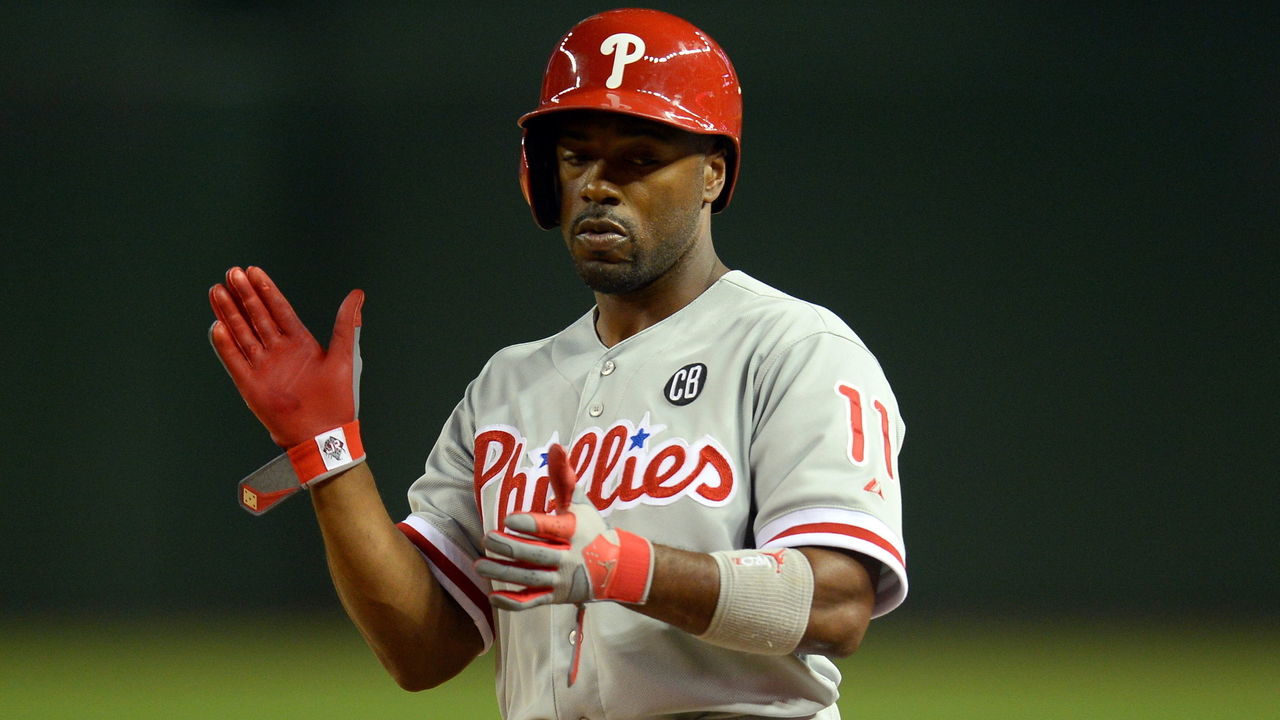
Position: SS
Teams: Phillies, Dodgers, White Sox
JAWS: 40.1 (34th at SS)
WAR: 47.6 (26th)
Year on ballot: 3rd (12.9% in 2023)
| GP | BA | OPS | H | HR | RBI | SB |
|---|---|---|---|---|---|---|
| 2275 | .264 | .743 | 2455 | 231 | 936 | 470 |
Rollins was one of the leaders of the Phillies' NL East dynasty in the early 2000s. His best year came in 2007 when he led Philadelphia to a division title by producing just the fourth (and most recent) 20-homer, 20-steal, 20-double, and 20-triple season in history - with 212 hits for good measure. Individually, Rollins won the 2007 NL MVP, a Silver Slugger, and four Gold Gloves, while playing on six playoff teams, two pennant winners, and a World Series champion in 2008. He's one of only three shortstops with 200 homers and 2,400 hits at the position, alongside Derek Jeter and Cal Ripken Jr., and he's the Phillies' all-time hits leader. And while his 95 OPS+ is low, it's still higher than some Hall of Fame shortstops, including Ozzie Smith and Luis Aparicio.
Of course, Smith and Aparicio made up for their lower offensive outputs with unmatched defensive brilliance. It's unfair to say that Rollins (or any shortstop) should match them defensively, but for all the hardware he collected, Rollins wasn't even close to the level below them. He ranks eighth in defensive runs saved at shortstop since tracking began in 2003 but sits 92nd in Baseball-Reference's all-encompassing stat fielding runs. Rollins was a very good and consistent hitter throughout his career but only had one truly great offensive campaign (his MVP season of 2007). Overall, he outranks only five non-Negro League Hall of Fame shortstops in both JAWS and WAR.
Between climbing into double digits with a net gain of 13 votes last January, and another four new votes so far in this year's tracker, it's clear that Rollins intrigues voters. Although he's nowhere near election and his credentials are easily debatable, he could be a name to watch over the next few cycles. But that's contingent on another big jump next week. If his candidacy really does have some legs, this is the year we'll find out.